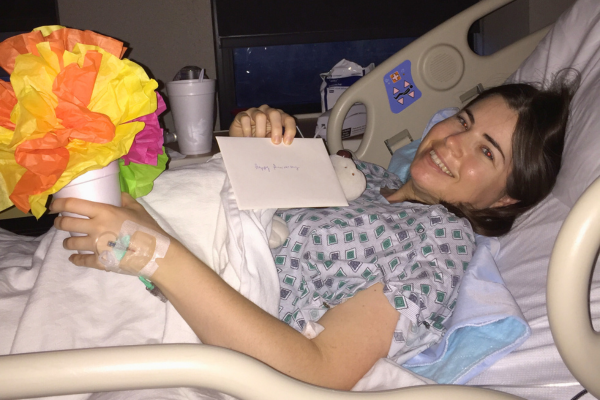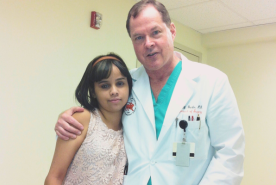May 02, 2024
By the time Lindsay met her future husband Denis in college, he had been dealing with kidney issues for years. It was a normal part of life that both Denis and Lindsay acknowledged but didn't dwell on.
Neither expected Denis' kidneys to fail in his early thirties. But when they did, Lindsay didn't hesitate. She gave him the gift of life–one of her kidneys.
Another Part of Life
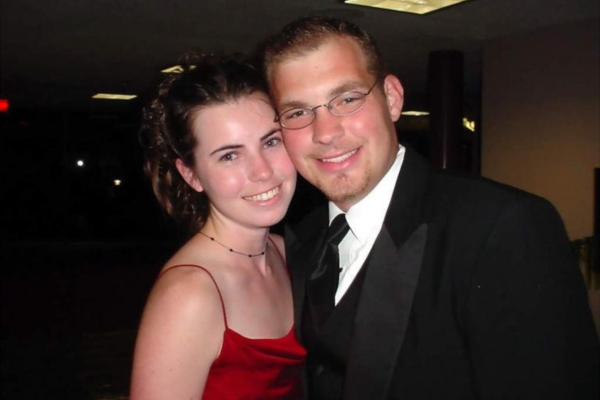
Lindsay and Denis fell into a comfortable routine. They graduated college, went on date nights, and furthered their careers.
Everything changed in their late twenties after they got married.
"He got gout, a painful condition that causes swelling in joints, around 2010. He couldn't get rid of it. I researched and learned that uric acid build-up causes gout. For Denis, it was a sign that his kidneys were not properly functioning," said Lindsay. "His kidneys were not filtering out the uric acid."
Denis went to his nephrologist, who ordered a kidney biopsy.
"The results were inconclusive. We transferred his care to the Mayo Clinic. They determined the biopsy hadn't taken enough tissue for a diagnosis," Lindsay said. "They did another biopsy and created an individualized care plan for Denis, checking his genetics at no cost."
An Answer
In 2011, genetic testing revealed an answer. Denis had Fibronectin glomerulopathy, a rare type of kidney disease caused by a FN1 gene mutation.
According to Denis’ nephrologist, Dr. Nabeel Aslam1, Fibronectin glomerulopathy is characterized by:
- Proteinuria or protein leaking into the urine
- Microscopic hematuria or blood in urine
- Hypertension or high blood pressure
- Progressive loss of kidney function.
"The mutation causes the kidneys to filter protein improperly," said Lindsay. "It's a progressive disease that damages the kidneys."
The puzzle pieces clicked together. Denis' father was diagnosed with kidney disease in the 1970s. He received a transplant in 2005 at 55 but passed away in 2015.
Denis assumed his kidney disease would progress at a similar rate.
"In 2016, Denis' kidney function dropped. We were shocked because he was only 34," Lindsay said. "We thought Denis had years before his kidneys failed."
With a diet change and medication, Denis held off kidney failure for a few months. During this, he prepared for peritoneal dialysis.
Have questions about living kidney donation? Take "Becoming a Living Donor" to learn everything you need to know.
Giving the Gift of Life
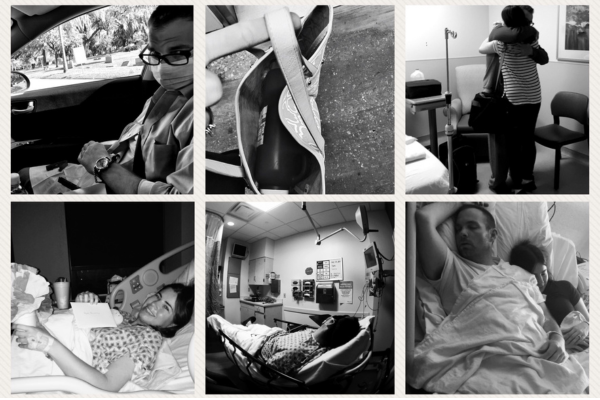
Collage of Lindsay's Black and White Photos
Lindsay began the living kidney donor evaluation process immediately. She wasn’t the only one. Many people from both sides of the family wanted that honor.
"I was determined to be his donor. He is my husband. I was the youngest of his potential donors. We had decided not to have children because of the genetic nature of his kidney disease, so I had less responsibility for others if it didn’t go well," said Lindsay. "We were so grateful, though. If I wasn't cleared to donate or one of us needed a transplant in the future, we know who to call."
Even with the determination, Lindsay struggled through the living kidney donor evaluation.
"There were so many tests. I was anxious because I wanted to be his donor so badly. I knew his healthcare team wouldn’t allow that if I wasn’t healthy enough," Lindsay said. "To cope, I went to counseling. I took black and white photos and created blog updates for our family and friends. I'm a competitive tennis player, so I played and exercised more."
Luckily, Lindsay was fit to donate and a match for Denis. The transplant was set for July 1, 2017, the day before their ninth wedding anniversary.
“The transplant almost got delayed. As a competitive athlete, I exercised and played tennis more than the average person. I also took a few nonsteroidal anti-inflammatory pain relievers (NSAIDs) for muscle pain two weeks before surgery,” Lindsay said. “This caused my liver enzymes to rise. I stopped exercising, canceled practice, and drank a lot of water a few days before the surgery.”
The morning of the surgery, Lindsay waited as the healthcare team tested her blood. Would her efforts to lower her liver enzymes pay off?
"They were normal! It was such a relief to move forward with the transplant," said Lindsay. "I recovered quickly but Denis had complications. He almost had a medical rejection and we spent a lot of time in the ER. We've since found a treatment plan to manage his kidney that works for him. He's doing great."
Take this free online course to learn more about life after kidney transplantation.
Becoming a kidney advocate
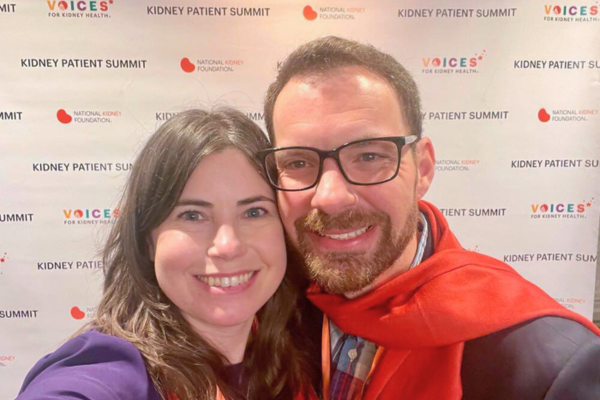
A few months after the transplant, Lindsay stumbled across Voices for Kidney Health, NKF's advocacy group. Intrigued, she signed up.
“Voices for Kidney Health makes advocating for better kidney health laws easy. After signing up, you get petitions sent to your inbox. You can sign and customize each alert with your story as a Voices advocate. Then NKF sends your signed petition or letter to your federal or state congress members," Lindsay said. "I signed and customized each one I sent. When we moved to a new state in 2019, the Kidney Advocacy Committee (KAC) asked if I wanted to get more involved."
Lindsay jumped at the chance, starting with monthly calls. Soon, she was leading her entire region's kidney advocacy efforts.
"I love that this work is nonpartisan. I can affect real change, no matter who is in office," Lindsay said. "I advocate for better kidney disease policy at the Kidney Patient Summit. I shared our story to help pass immunosuppressive drug legislation. We continue to get involved to help other living donors or potential donors."
KAC has also shown Lindsay that she isn't alone.
"I wish I had known about NKF before my donation. The education and peer mentorship program would have been invaluable," said Lindsay. "I am glad I eventually found KAC, though. This work helps me feel like a part of the community. We have similar stories and struggles. We are there for each other and I can't wait to see what we accomplish next."
Do you want to make a difference like Lindsay? Become a Voices for Kidney Health advocate to get started.
Source
1Aslam, N., Singh, A., Cortese, C. et al. A novel variant in FN1 in a family with fibronectin glomerulopathy. Hum Genome Var 6, 11 (2019). https://doi.org/10.1038/s41439-019-0042-
